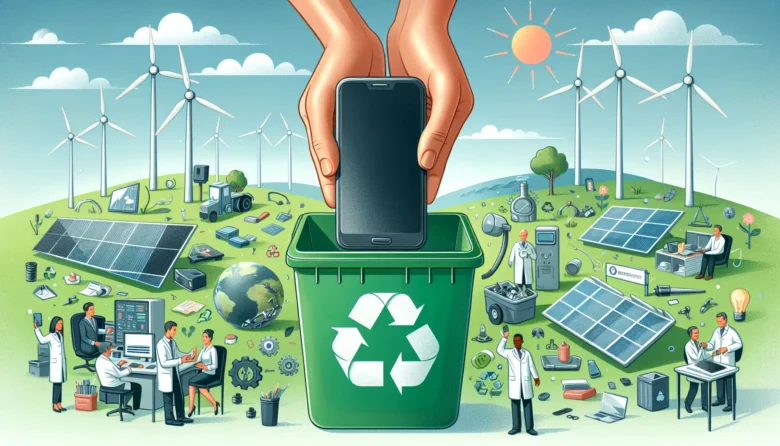Eco-Tech is committed to solving environmental issues by minimizing resource consumption and emissions and emphasizing pollution prevention rather than cleaning up after-the-fact toxic waste. Academic research in this area employs various analytical tools. Life cycle assessments offer standard frameworks to measure the true ecological costs and benefits associated with technologies.
Renewable Energy
Utilizing solar energy to power homes and businesses reduces carbon emissions while helping the environment. Furthermore, adopting energy efficiency techniques in industry can also lower operational costs and emissions. Climate change has emerged as an urgent global threat, with scientific reports depicting dire predictions for its long-term impacts—such as extreme weather events, food insecurity, and displacement. Utilization of renewable sources like solar and wind power is therefore essential for a sustainable future.
Renewables also offer energy independence and security. While fossil fuels require international resources for production, renewable energy production can occur locally, lessening reliance on volatile global markets while mitigating geopolitical instability.
However, it should be remembered that renewables do still produce and dispose of environmental impacts during production and disposal processes; fortunately, innovative technologies such as waste-to-energy systems and circular economy models are helping mitigate such negative consequences.
Smart Homes and Cities
Home and city living can produce substantial greenhouse gas emissions, but eco-tech is changing these environments with smart technologies that reduce energy use while encouraging sustainable living practices. Smart devices connect to the Internet, making it simple for homeowners and cities alike to monitor and control their environments. Smart thermostats, voice assistants like Alexa or Siri, and waste management systems equipped with sensors can automatically adjust based on weather conditions, prevent trash bin overflow, and reduce emissions from truck trips to dump trash.
Other smart tech innovations include waste-to-energy systems that convert trash to renewable energy; new materials that make cars and electronics more durable, reducing resource waste; and smart grids and IoT that connect building components with the power grid for more efficient energy distribution and quick repairs in case of power outages—innovations that contribute to creating a sustainable future for businesses, governments, and individuals both locally and globally.
Artificial Intelligence
As artificial intelligence transforms from predictive to generative capabilities, its use has become more central in driving eco-friendly innovation. However, we must overcome numerous environmental challenges, which range from data collection to modeling and AI training.
Technology can provide a solution. New chip technologies have significantly decreased the energy used to generate AI models. Furthermore, tools such as the EcoTech Framework allow developers to identify and reduce carbon emissions associated with their AI models.
Digitalization can also help promote resource efficiency through waste-to-energy systems and circular economy models, lowering emissions while replenishing natural resources. Furthermore, real-time monitoring of energy usage allows organizations to address any inefficiencies that arise and facilitates sustainable consumption and production practices.
Electric Vehicles
Multiple factors have led to the surge in popularity of electric vehicles (EVs), including advances in lithium-iron-phosphate battery technology and expanding charging infrastructure. Furthermore, electric cars produce significantly fewer emissions than fossil fuel vehicles during manufacturing and use, contributing greatly to energy security by decreasing dependency on imported oil imports while simultaneously improving economic stability and resilience.
EV sales growth can also be explained by increasing national and international sustainability initiatives, with many countries setting targets to reach zero-emission transportation by 2035 or sooner as part of their broader sustainable development goals, such as climate change mitigation or moving toward circular economy models with reduced landfill usage.
Electric vehicles (EVs) present a multitude of benefits compared to their conventional counterparts, such as lower maintenance expenses and enhanced fleet efficiency. Yet widespread adoption will require more than new vehicle models and better charging stations—it will require breaking through political barriers and creating inclusive dialogue around sustainable transportation initiatives in order to accelerate the shift toward greener mobility solutions.
Community Engagement
Community engagement is an ongoing process in which citizens take an active part in decisions that affect them, creating dialogue among community members and forming long-term relationships while also addressing various aspects of social equity, trust, and accountability.
Engagement of community is about instilling ownership and developing a vested interest in sustainable initiatives, which is why it’s critical to incorporate community input throughout project planning stages—this helps ensure plans and programs are practical, effective, and sustainable.
Sustainability is a choice we can all make every day, whether by switching to energy-saving LED bulbs, installing smart thermostats to optimize household resource usage, using eco-conscious technologies in our transportation options like electric vehicles or public transport, purchasing locally produced food to reduce travel miles and carbon emissions, or adopting corporate responsibility practices that have positive environmental benefits—each action contributes to sustainable living!




